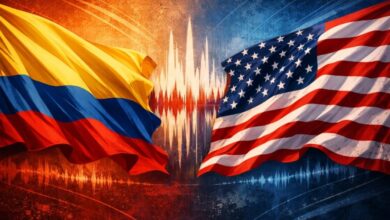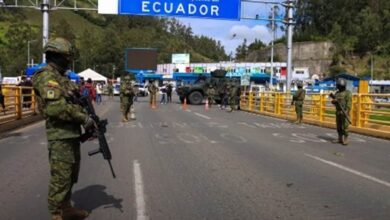Is Canada’s Hard Drugs Decriminalization a Threat to the Latin American Drug Trade?
Canada decriminalized the use of drugs such as cocaine and heroin in the province of British Columbia: How harmful is this decision for illicit drug trafficking businesses in countries like Colombia or Mexico? What consequences will the decriminalization of hard drugs bring?.

Photo: Freepik
LatinAmerican Post | Christopher Ramírez
Listen to this article
Leer en español: ¿Es la despenalización de drogas duras en Canadá una amenaza al narcotráfico latinoamericano?
On January 31, the province of British Columbia, in Canada, began a pilot plan with which it decriminalized the possession of hard drugs such as cocaine, heroin, fentanyl, methamphetamine, among others.
As explained by the Canadian federal government, all citizens over the age of 18 who are caught with a maximum of 2.5 grams of these substances will be covered by the new rule. In other words, the Police will not be able to fine, arrest or charge these people for the use and possession of illegal substances. In addition, they will not be able to confiscate said drugs either.
Why was this decision made?
For the Government of British Columbia, this pilot was conceived as an idea to avoid at all costs the social trial against consumers in its territory. In short, what is intended is not to increase the number of addicts, but rather to promote their reduction through the normalization of drugs.
"This is a monumental change in drug policy that favors the promotion of trusting and supportive relationships in health and social services instead of greater criminalization," said the federal minister for mental health and addictions, Carolyn Bennett.
For her part, Jennifer Whiteside, British Columbia's Minister of Mental Health and Dependencies, said that "decriminalizing people who use drugs removes the fear and shame associated with substance use and makes them feel safer seeking help."
“Instead of treating these people like criminals, they will be given care and compassion. They will have access to information,” she added.
It should be remembered that drug overdose death is the leading cause of unnatural death in British Columbia, with close to 10,000 deaths since this Canadian province determined that hallucinogenic substances were a public health emergency in 2016.
A threat to drug trafficking in Latin America?
However, the objective of reducing death rates from hard drugs in Canada cannot be precisely translated as a fight against Latin American drug trafficking. In recent years, various NGOs and experts have seen legalization as a viable option to counteract black market drug deals in the region.
However, the pilot that settled in British Columbia does not legalize the use of drugs such as cocaine and heroin, but rather decriminalizes it. As explained by Luis Carlos Restrepo, a surgeon from the National University and a psychiatrist from the Javeriana University in Colombia, decriminalizing is not the same as legalizing, and their differences lie in the perception of the same problem from different approaches: one individual and the other, collective.
“Decriminalizing means that the individual is free to consume, as long as it does not violate the rights of others or endanger citizen coexistence. To legalize is to allow production, sale, and even the promotion of consumption," Restrepo said in an interview with the newspaper El Tiempo in 1994.
In this order of ideas, when Canada decides to decriminalize the use of hard drugs, it does so in order not to stigmatize consumers, but not to allow their trafficking without any legal or social retaliation.
This was detailed by Minister Bennett, who stressed that all production, trafficking, import and export activities of these substances are illegal, not only in British Columbia but throughout Canada.
Another point to take into account, after explaining the previous one, is that Canada is not a country that produces drugs like cocaine. In this case, others that are, such as Colombia or Mexico, have a free hand to continue generating income with the black market for this drug.
For example, 2022 concluded with a 43% increase in coca crops in Colombia, which makes this country the largest cocaine producer in the world, according to a report by the United Nations.
Also read: Did the Drug War in Mexico really end?
Is the legalization of marijuana a mirror?
It should be remembered that in 2018, Canada became the second American country (behind Uruguay in 2013) to legalize the recreational use of marijuana throughout its territory. As indicated above, being a legalization process, this drug and everything related to its production, trafficking and consumption has been a legal activity in that country for more than 4 years.
This caused an increase in own cannabis cultivation in Canada, as well as its traffic by producers located very close to the border with the United States. In fact, even before legalization it was normal for the supply of marijuana to be made from these points and not from South American countries such as Mexico.
“ Cannabis legislation in Canada will not have a major effect on the black markets in Mexico, because most of the Mexican cannabis that goes north stays in the United States” said Lisa Sánchez, director of the Latin American program at the Foundation to Transform Drug Policy.
Even with this, organized crime groups in Latin America have sought a way to continue bringing the drug to Canadians, even when that country already has its own production market.
In addition, for several years now cocaine and heroin have been the drugs that have taken center stage in the world of drug trafficking, despite the fact that the United States and Canada itself, as well as various international organizations, continue to hinder their legalization.
In short, decriminalizing hard drugs in the north of the American continent does not mean ending the illicit business behind them. Decriminalization is just a way to socially legitimize the drug that manages to pass from the hands of the authorities and reach the consumers.





